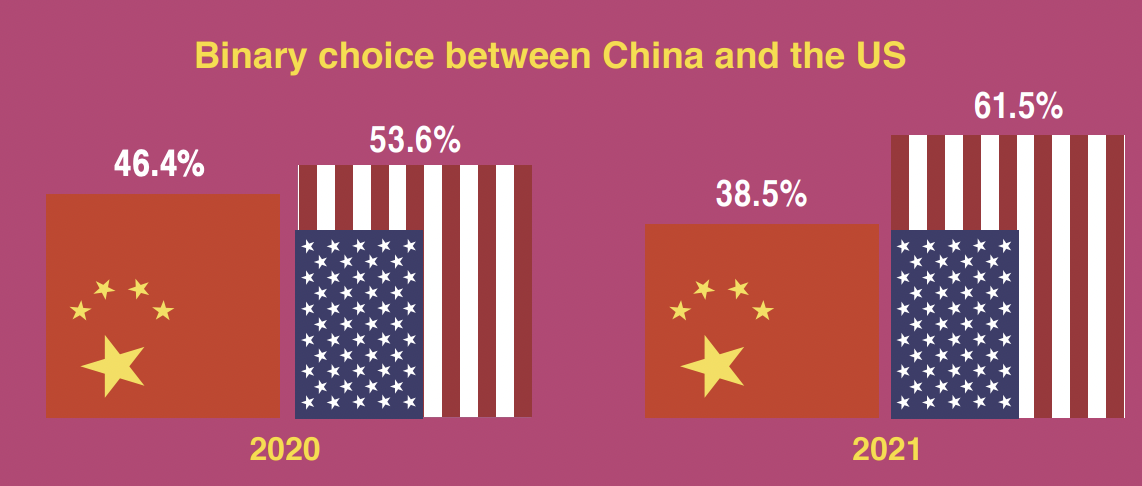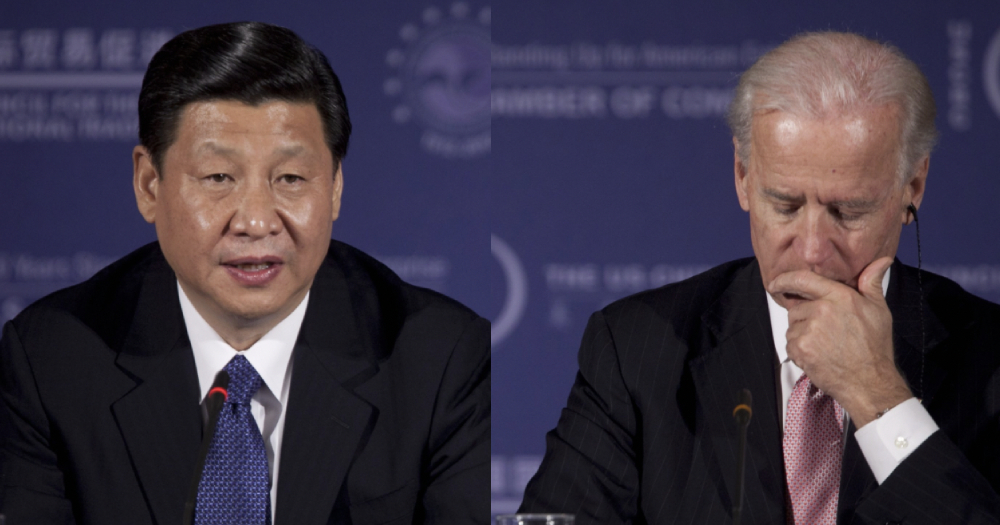Follow us on Telegram for the latest updates: https://t.me/mothershipsg
If forced to align themselves with either China or the United States, the majority of respondents in a poll conducted among Asean countries said they would choose the U.S. over China.
More would rather choose to align with the U.S. than China
According to a survey conducted online by Singapore-based research centre ISEAS-Yusof Ishak Institute from Nov. 18 last year to Jan. 10 this year among 1,032 respondents, 61.5 per cent of respondents said they would rather align with the U.S.
This is in contrast with 38.5 per cent who chose China, which is a significant drop from 46.4 per cent who said the same in 2020.
 Graph via ISEAS-Yusof Ishak Institute
Graph via ISEAS-Yusof Ishak Institute
The study's researchers noted that the drop in percentage is in spite of China's intensive Covid-19 diplomacy in the region, that included the donation of Personal Protective Equipment to countries including Singapore.
China still seen as most influential power in the region
However, China remains the most influential economic power in the region, with a whopping 76.3 per cent of respondents who view China this way.
Out of these respondents, most of them point to worries about China's growing economic influence. Similar to last year's survey results, this concern is seen most in Vietnam (90.4 per cent), Thailand (79.3 per cent) and the Philippines (77.5 per cent).
Such perceptions contrast sharply with Cambodia and Laos, where most respondents welcome China's economic influence (52.4 per cent and 51.4 per cent respectively).
Region's trust in China dropped
The study's researchers also noted that the region's lack of trust in China has risen, from 60.4 per cent in 2020 to 63.0 per cent in 2021. This makes China the only major power to have an increased trust deficit among Asean states as well.
The results are similar to last year's survey, which concluded that while China is seen as the most influential economic and political-strategic power in the region, its growing influence is not well-received by the region.
This is due to the worry that China's economic heft, combined with its military power, could be used to threaten the sovereignty and interests of the respondents' countries.
The report suggested that for the region's perception of China to improve, China should "take the mantle of leadership in a manner that does not impinge on the sovereignty and strategic autonomy of its neighbouring countries".
Region welcoming of U.S. despite recent developments
In contrast with growing scepticism of China, the region remained welcoming of U.S. influence despite recent developments, such as electoral fraud claims by former U.S. President Donald Trump, and the Capitol Hill siege.
In fact, the region’s trust in the U.S. surged significantly compared to the previous year, rising by 18 per cent in positive ratings from 30.3 per cent in 2020 to 48.3 per cent in 2021.
While the study's researchers were unclear about the reasons behind such a rise, they pointed out possible reasons, such as respondents leaving behind "the past four years of dismal engagement with Asean under the Trump presidency", and becoming more "bullish" as current U.S. President Joe Biden takes over.
Japan the most trusted major power
The most trusted major power in the region, however, is Japan, with the overall trust level increasing from 61.2 per cent in 2020 to 67.1 per cent in 2021.
When asked why they trust Japan, most respondents (51.6 per cent) said it was because they think it is "a responsible stakeholder that respects and champions international law".
Most respondents who chose this option were from Brunei and Singapore (77.3 per cent and 73.1 per cent respectively).
Along with Japan, the European Union (51.0 per cent) is also the front-runner for Asean's most favoured and trusted strategic partner in hedging against U.S.-China rivalry
Region more worried about Chinese militarisation in South China Sea than American military presence
When asked about their greatest concerns over the South China Sea, a majority (62.4 per cent) said they were most concerned with China's militarisation and assertive actions in the region.
This contrasts with 12.5 per cent of respondents who said they were worried over increased U.S. military presence in the area -- while respondents in Laos (37.5 per cent) and Cambodia (30.8 per cent) are concerned about it, those surveyed in Singapore (6.3 per cent), Vietnam (4.6 per cent) and the Philippines (4.5 per cent) have little qualms over it.
This is followed by a concern for Chinese encroachments in the exclusive economic zones in the sea, and continental shelves of other littoral states (59.1 per cent).
Such a concern is more prevalent among claimant states, such as the Philippines (86.6 per cent), Vietnam (84.6 per cent), Brunei (63.6 per cent), and Malaysia (63.2 per cent).
The third biggest concern among Asean states is the possibility of military confrontation between the U.S. and China, with 45.2 per cent of respondents expressing this view.
Top image by Andrew Harrer/Bloomberg via Getty Images
If you like what you read, follow us on Facebook, Instagram, Twitter and Telegram to get the latest updates.
